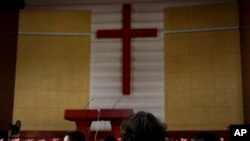According to the recently released 2015 State Department International Religious Freedom Report, the Chinese government continued to exercise state control over the practice of religion.
Over this past year, reports continued to surface that the government physically abused, detained, arrested, tortured, incarcerated, or harassed adherents of both registered and unregistered religious groups for activities related to their beliefs and practices.
Human rights organizations stated that police shot and killed Uighur Muslims during house raids and protests after the introduction of stricter government controls on religious expression and practice in the Xinjiang Uighur Autonomous Region. A Falun Gong group reported abductions, detention, and a death in police custody related to adherents’ beliefs and practices.
According to media and non-governmental reports, seven Tibetans self-immolated during the year in protest of restrictive government policies. Authorities often justified official scrutiny of Tibetan Buddhist monasteries by associating expression of Tibetan Buddhist faith with “separatism” and pro-independence activities.
According to NGO and press reports, authorities in Zhejiang Province ordered the removal of more than 1,500 crosses on Christian churches and the demolition of some church buildings as part of a campaign against “illegal structures.”Many Zhejiang pastors and congregants openly resisted the campaign, resulting in the detention of several church leaders and activists, including Pastor Huang Yizi and lawyer Zhang Kai.
Local authorities in many areas used a variety of means to punish members of unregistered religious or spiritual groups, including Christian “house churches.” Authorities in Guangdong Province sentenced Buddhist leader Wu Zeheng to life in prison on what advocacy groups stated were politically-motivated charges.
As a signatory of the Universal Declaration of Human Rights, China made a commitment to respect the right to freedom of thought, conscience and religion.“When a government denies religious liberty, it turns citizens who have done nothing wrong into criminals, igniting tension that breeds contempt, hopelessness, and alienation,” said Deputy Secretary of State Antony Blinken at the release of the 2015 International Religious Freedom Report.
Deputy Secretary Blinken went on to say, “Religious pluralism shows respect for the beliefs of every citizen and gives each a tangible reason to contribute to the success of the entire society. That’s why no nation can fulfil its potential if its people are denied the right to freely choose and openly practice their faith.”






